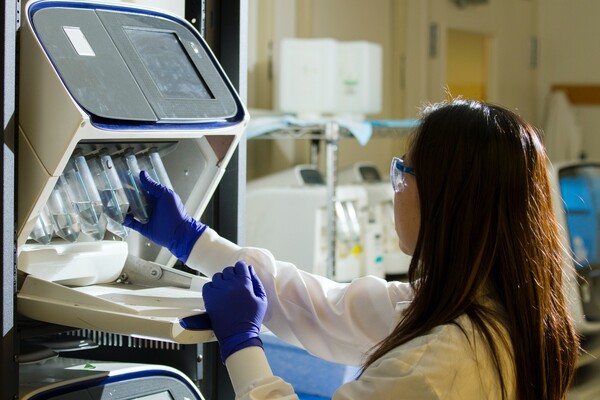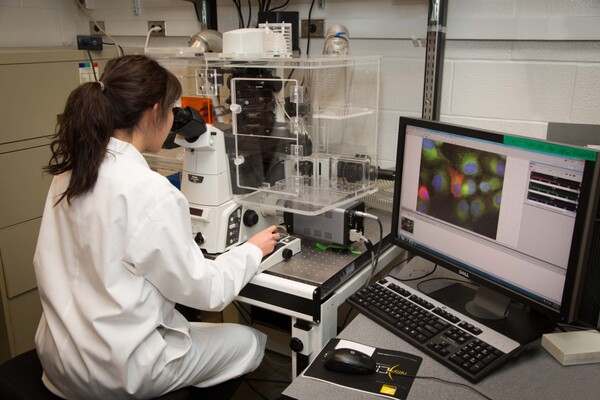
Main Second Level Navigation
Breadcrumbs
Pharmacology
MSc & PhD
Pharmacology is the study of drugs and involves examining the interactions of chemical substances with living systems. The intent is to understand the properties of these drugs and their actions, including the interactions between drug molecules and drug receptors and how these interactions elicit an effect. In the Department of Pharmacology and Toxicology, our courses examine the different classes of drugs, how they are used therapeutically, their mechanisms of action, how they are handled by the human body, and their role in society.
We offer both MSc and PhD degrees in pharmacology. As the largest pharmacology department in North America, we have a breadth of research interests that encompass our four research foci: mechanisms of drug action and drug discovery; drug safety and toxicology; neuropharmacology and addiction; and variability in drug response and pharmacogenetics.
Research laboratories are located on the St. George campus, and across our nine university-affiliated research institutes and teaching hospitals. This strategic positioning enables a wealth of potential opportunities for interdisciplinary collaboration with internationally recognized investigators within one of the largest and densest existing concentrations of biomedical research expertise in North America.
Our Programs

In addition to completing a thesis, students take:
- PCL 3000H (Foundational Pharmacology Principles, 0.25 FCE*)
- PCL 3001H (Pharmacology Research & Communication Skills 0.25 FCE)
- Elective courses (0.25 FCE)
Typically, students successfully finish this program in 2 years.

In addition to conducting independent and original research that will form their thesis, students complete:
- PCL 3000H (Foundational Pharmacology Principles, 0.25 FCE)
- PCL 3001H (Pharmacology Research and Communication Skills, 0.25 FCE)
- PCL 3002H (PhD Research Proposal, 0.25 FCE)
- PCL 1003Y (Seminars in Pharmacology, 1.0 FCE)
- Elective courses (1.0 FCE)
Typically, students successfully complete this program in 5 years.
Alumni Profile

Chidera Chukwueke, PhD
I recently completed my MSc and PhD in Pharmacology. My master’s thesis focused on neuroimaging and behavioural experimental tools to explore the role of neurotransmitter systems in addiction. During my PhD, I explored the influence of dopamine D3 and cannabinoid CB1 receptors in substance use disorders. My thesis research led to three first-author published research articles and three first-author book chapters.
During my PhD, I became interested in business. I completed courses through the Rotman School of Management and took on leadership roles with the Graduate Management Consulting Association and the University Consulting Group.
Following the completion of my PhD, I transitioned to a role with Oliver Wyman, a global top 10 strategy firm, as a management consultant.
Potential Career Paths
In 2022, the School of Graduate Studies (SGS) tracked the career outcomes of 5,128 PhD students who graduated from the University of Toronto between 2016 to 2021. The data below is from 52 pharmacology PhD graduates.
Positions
Some examples of the positions our pharmacology graduates held included:
- Postdoctoral fellowships
- Hospital-based jobs
- Biotechnology and pharmaceutical jobs
Employers
Some examples of employers for whom our pharmacology graduates worked included:
- Centre for Addiction and Mental Health (CAMH)
The chart below shows a percentage breakdown of the various sectors in which our pharmacology PhD graduates worked at the time the survey occurred.
Main Employment Sectors of Pharmacology PhD Graduates
Chart data
| Post-Secondary Education | Private Sector | Public Sector | Charitable Sector | Individual Sector | Info Not Public/Other |
|---|---|---|---|---|---|
| 28.8 | 42.3 | 13.5 | 1.9 | 1.9 | 11.5 |
By the Numbers
Department of Pharmacology and Toxicology
*Full course equivalent. A typical 0.5 FCE is over one term (13 weeks), meeting 1-2 times per week. A typical 1.0 FCE is over two terms (26 weeks), meeting 1-2 times per week.